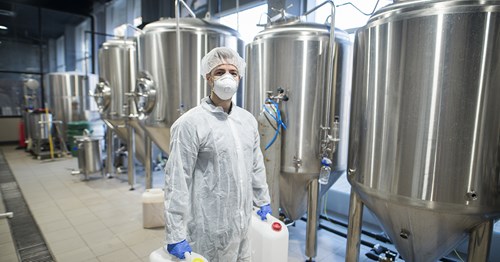A look at the long-standing federal protections important for employees during the global pandemic.

Across the country, employees deemed essential and therefore expected to work despite the COVID-19 crisis are concerned for their health and safety. Dangerous work conditions, close contact with others, and a lack of protective equipment are some of the many factors that have led workers to take a stand, demanding protective measures such as safety gear, sick leave benefits, and higher pay, writes Jules Bernstein, a Washington, D.C.–based labor lawyer, in an article for The American Prospect.
Some employees have been successful in pushing employers to improve workplace safety measures, but those who haven’t are still forced to report to work despite their fears. In fact, some employees are facing repercussions when voicing their concerns and some are remaining quiet altogether in fear of losing their jobs.
But there are federal protections that could protect workers should they feel the need to refuse to work because of hazardous conditions: Section 502 of the Labor Management Relations Act of 1947 (the Taft-Hartley Act) and the Occupational Safety and Health Act of 1970 (which created the agency known as OSHA), writes Bernstein. Although Taft-Hartley restricted employees and unions from engaging in organizing and bargaining, while tightening limitations on strikes, the act also includes Section 502, which states that if employees refuse to work because of “unusually dangerous conditions,” they may not be subjected to discharge or permanent replacement.
Additionally, the OSHA of 1970 requires employers to ensure all workplaces are free from hazards likely to cause death or serious physical harm, including viruses. In fact, in 1980 the United States Supreme Court in Whirlpool v. Marshall upheld a Department of Labor OSHA Regulation, 29 C.F.R. Sec. 1977.12(b)(2), that protects employees from discrimination for refusing to perform work under dangerous conditions. However, with no private right of legal action available under the act, and the OSHA’s poor record of enforcement, essential employees need all the protection they can get, explains Bernstein. “That the coronavirus and COVID-19 are new does not mean that employers have no duty to protect employees from them in every possible way. Section 502 of Taft-Hartley and the Court’s ruling in Whirlpool v. Marshall appear to have been written precisely for moments like these.”
Bernstein notes that in late March, Speaker Nancy Pelosi and leading House Democrats pushed for legislation requiring OSHA to set emergency workplace standards in the three bills enacted by Congress in reaction to the pandemic crisis, but the attempts were blocked three times by the Senate and the Trump administration. The Democrats plan to make the legislation a leading feature in the next bill.
Click here to read the entire article.
